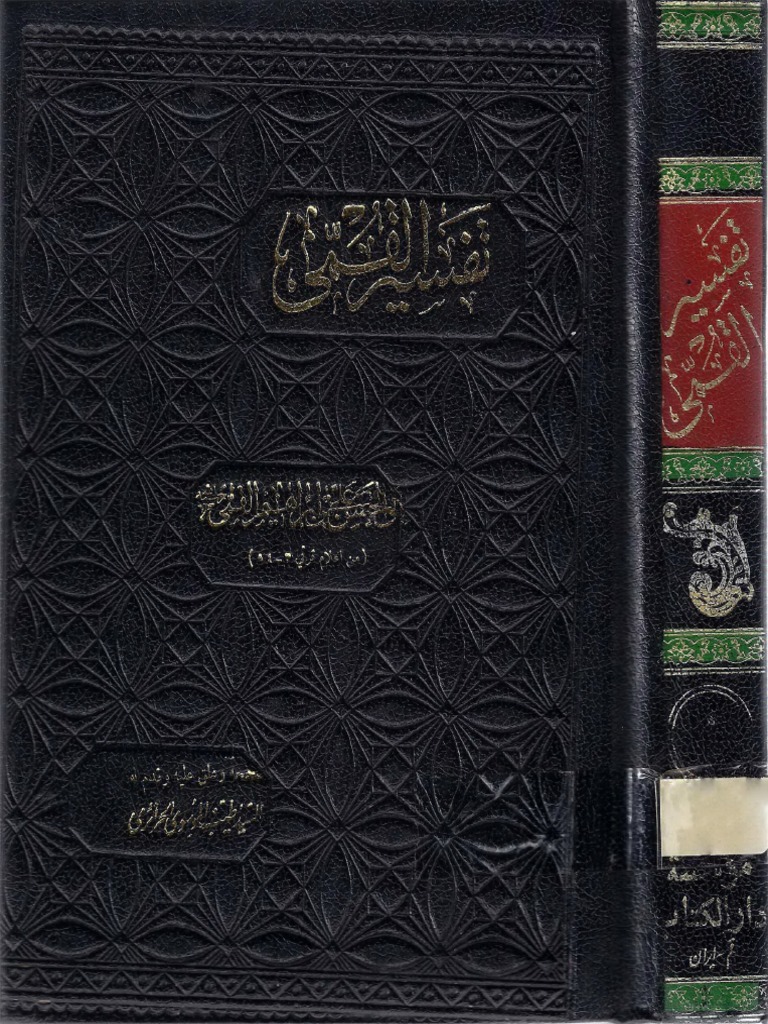The realm of Islamic exegesis is rich and textured, woven with diverse interpretations and lenses through which the Qur'an has been viewed and understood. Among the numerous commentators throughout history, Ali ibn Ibrahim Al-Qummi stands as a preeminent figure within Shia Islam. His contributions not only elucidate the Qur'anic text but also integrate elements of Shia theology, history, and jurisprudence. The unique combination of linguistic competence and theological insight propels his exegesis beyond mere academic inquiry, rendering it a crucial component of Shiite thought and practice.
The Tafsir of Ali ibn Ibrahim Al-Qummi is notable for its comprehensive nature. It does not merely delve into the linguistic aspects of the Qur’anic verses; rather, it seeks to encapsulate the manifold layers of meaning and interpretation that one can derive from the sacred text. Addressing a panoply of themes, including historical contextualization and theological explorations, this Tafsir emerges as a vital discourse on divine guidance.
Historical Context and Authorial Background
Ali ibn Ibrahim Al-Qummi was born in the second century of the Islamic calendar, in a milieu that was rife with theological debate and scholarly fervor. As a contemporary of other exegeses, his work resonates through the ages, reflecting the sociopolitical and spiritual currents of his time. Understanding the historical backdrop against which he penned his Tafsir is indispensable; the tumult of early Islamic history, marked by sectarian strife, necessitated a thoughtful articulation of religious texts that could fortify the Shia community's identity.
Al-Qummi himself was a learned scholar and is often regarded as a link within the chain of transmission of Shiite knowledge. His erudition in language, coupled with his deep understanding of hadith literature, allows for a nuanced interpretation of the Qur’an, resulting in a Tafsir that serves both as a commentary and a defense of Shia beliefs.
Methodology of Tafsir
The methodology employed by Al-Qummi in his Tafsir is marked by a distinctive hermeneutical approach. Unlike many commentators who may rely heavily on purely linguistic or rhetorical analyses, he weaves an intricate narrative that integrates Shia traditions, historical events, and broader theological reflections. This enables the reader to appreciate the depth and dynamism of the Qur’anic text.
One significant aspect of his Tafsir is its reliance on the ahadith (traditions) of the Prophet Muhammad and the Imams of the Shia tradition. By referencing these narratives and linking them to Qur’anic verses, Al-Qummi not only reinforces the legitimacy of Shia beliefs but also offers a compelling perspective on divine will and instruction as manifested through historical and celestial events.
Thematic Exploration
A fundamental theme in the Tafsir of Ali ibn Ibrahim Al-Qummi is the concept of divine justice. His work frequently addresses the moral and ethical imperatives outlined in the Qur'an, emphasizing the importance of justice both in individual conduct and within the broader societal framework. Through elucidating verses that speak to justice, equity, and ethical considerations, Al-Qummi instills in his readers a robust understanding of their responsibilities as both individuals and members of a community.
Furthermore, Al-Qummi addresses the importance of knowledge and understanding in the pursuit of faith. He contends that the Qur'anic message demands not only belief but also intellectual engagement. The multifaceted nature of his interpretations encourages readers to approach the text with both reverence and inquisitiveness, fostering a culture of scholarly inquiry that resonates through centuries within the Shia tradition.
Contemporary Relevance
The fascination with Al-Qummi's Tafsir extends into contemporary discourse where issues such as social justice, ethical governance, and interfaith dialogue find resonance with his exegesis. In today's world, where sectarianism and polarization often dominate the narrative, the appeal of Al-Qummi's commitment to justice and ethical living serves as a relevant counter-narrative. His focus on justice and morality underscores the Shia ethos and highlights the shared responsibility of Muslims toward the betterment of humanity.
Moreover, scholars and students alike continue to dissect his writings, engaging with his interpretations to derive lessons pertinent to contemporary socio-political issues. The application of his insights in modern contexts generates a rich dialogue that reaffirms the living tradition of interpretation and understanding within Shiite Islam.
Conclusion: A Living Act of Faith
In sum, the Tafsir of Ali ibn Ibrahim Al-Qummi stands as a monumental work that transcends mere text to embody an entire tradition of thought and practice. The intricate interplay of theology, history, and ethics provides a holistic view of the Qur'an that continues to captivate scholars and laypersons alike. As the Shia community reflects on Al-Qummi’s contributions, they are reminded that the study of faith is not static; it is a dynamic pursuit of understanding that is as vital today as it was in his time.
The enduring allure of Al-Qummi's Tafsir lies in its capacity to inspire contemplation and action, urging adherents to connect deeply with the sacred text and to navigate their lives through the lens of Shia teachings. His legacy, therefore, is not merely as a scholar but as a catalyst for a deeper engagement with the Qur'an, a call to embody its teachings in all facets of life.


